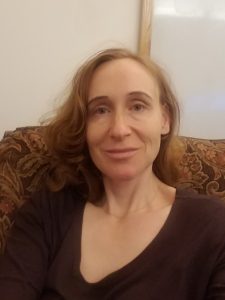Julia Kempe facts for kids
Julia Kempe is a brilliant scientist who works on quantum computing. This is a special type of computer science that uses the strange rules of tiny particles to solve very hard problems. She is from France, Germany, and Israel. Today, she leads the Center for Data Science at NYU. She is also a professor at the Courant Institute, which is a famous math and computer science school.
Contents
Julia Kempe's Early Life and Studies
Julia Kempe was born in East Berlin. Her family had roots in Russia. In 1990, she moved to Austria. She started her university studies in 1992. She studied mathematics and physics at the University of Vienna until 1995. During this time, she spent a year in Australia. She was an exchange student studying physics at the University of Technology Sydney.
Advanced Degrees and Research
After her first degree, Julia Kempe went to France. In 1996, she earned a Master's degree in mathematics. This was from Pierre and Marie Curie University. The next year, 1997, she earned another Master's degree. This one was in physics from the École normale supérieure.
She then completed two doctorates in 2001. One was a Ph.D. in computer science. Her research was about "Quantum Computing: Random Walks and Entanglement." Her other Ph.D. was in mathematics. She earned this from the University of California, Berkeley. Her work there was on "Universal Noiseless Quantum Computation: Theory and Applications."
Julia Kempe's Professional Journey
After finishing her studies, Julia Kempe began her career. In 2001, she joined CNRS in France. This is a big research organization. She worked at the University of Paris-Sud. She also did some extra research at Berkeley.
In 2007, she became a faculty member at Tel Aviv University. Later, in 2010, she moved her CNRS position. She went from Paris-Sud to Paris Diderot. For several years, from 2011 to 2018, she worked as a researcher in finance. In September 2018, she became the director of the Center for Data Science at NYU. She also became a professor at the Courant Institute.
Awards and Special Recognitions
Julia Kempe has received many awards for her amazing work. In 2006, she won the bronze medal from CNRS. She also received the Irène Joliot-Curie Prize from the French government. This prize honors women in science.
In 2009, she won the Krill Prize from the Wolf Foundation. The next year, 2010, she won the Trophée des femmes en or. This means "Women in Gold" trophy. It was given for her important research. She also received a special award in 1998. It was from the Studienstiftung des Deutschen Volkes. This award was given to only a very small number of students. In 2010, she was made a knight in the National Order of Merit. This is a high honor in France. In 2018, she was chosen to join the Academia Europaea. This is an academy for top European scholars.
 | Stephanie Wilson |
 | Charles Bolden |
 | Ronald McNair |
 | Frederick D. Gregory |


